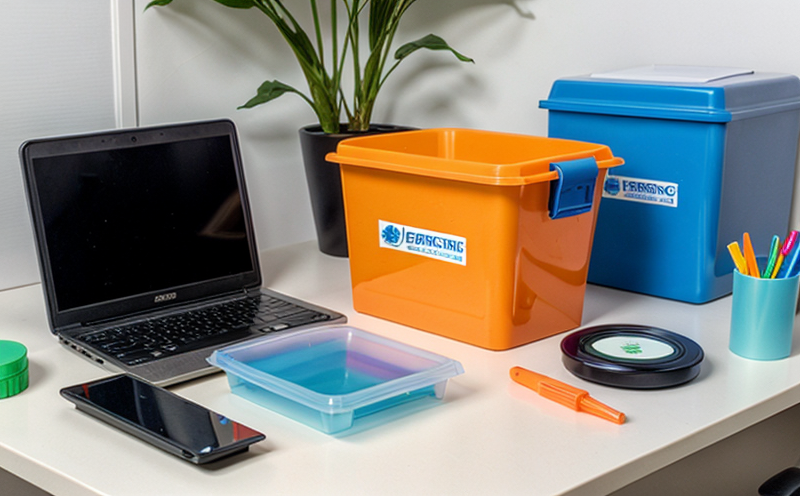EN 12721 Resistance to Wet Heat Testing of Office Plastic Surfaces
The EN 12721 standard provides a robust framework for testing the resistance to wet heat of office plastic surfaces. This test is crucial in ensuring that materials used in office environments can withstand environmental conditions without compromising on performance or safety.
This method is particularly important given the high humidity levels and frequent exposure to water in many office settings, such as near windows, near air conditioning units, or in areas with frequent cleaning activities. The standard specifies that specimens must be exposed to a combination of heat and moisture, which simulates real-world conditions under which plastic materials may be used.
The test procedure involves several steps: the preparation of the specimen, the application of wet heat, and finally, the assessment of any changes in properties such as color, texture, or structural integrity. The specimens are typically exposed to a temperature of 60°C for at least four hours while being kept moist by a saturated salt solution. This duration is chosen based on extensive research into typical environmental conditions and expected durability requirements.
The preparation step requires careful handling and cutting of the plastic samples to standard dimensions, ensuring that they are representative of the material's intended use in office environments. The specimens must be conditioned at room temperature before testing to ensure accurate results reflecting real-world performance.
After exposure to wet heat, the specimens undergo a series of inspections to evaluate their resistance to this environmental stressor. Visual assessments check for changes in color or texture, while mechanical tests assess any loss in strength or flexibility. The standard also specifies quantitative methods such as measuring changes in dimensions or weight to provide an objective assessment.
Understanding the importance of this test is vital for quality managers and compliance officers who ensure that products meet regulatory requirements and maintain their integrity over time. For R&D engineers, this test offers valuable insights into material behavior under specific conditions, aiding in product development and innovation. Procurement professionals can leverage these results to select suppliers providing materials that will perform reliably in office environments.
Compliance with EN 12721 is not just about meeting regulatory requirements but also about ensuring the longevity of products used daily by employees. This test helps manufacturers produce durable, reliable plastic surfaces that enhance safety and functionality within offices.
- Visual Inspection: Checks for changes in color or texture after exposure to wet heat.
- Mechanical Testing: Assesses any loss in strength or flexibility due to environmental stressors.
- Quantitative Methods: Measures changes in dimensions or weight to provide an objective assessment of material properties.
The use of this standard ensures that office plastic surfaces are not only aesthetically pleasing but also functional and safe, contributing significantly to a healthy work environment. By adhering to these stringent testing protocols, manufacturers can build trust with their customers, ensuring they receive products that meet the highest quality standards.
Applied Standards
The EN 12721 standard is part of a broader framework for material testing in various industries. It aligns closely with other international standards such as ISO and ASTM, ensuring consistency and reliability across different regions. This harmonization helps manufacturers and users alike to ensure that products meet the same rigorous requirements worldwide.
EN 12721 specifically targets plastic materials intended for use in office environments where they are likely to be exposed to wet heat conditions. By aligning with this standard, manufacturers can guarantee their products' resistance to environmental stresses, thereby enhancing product durability and safety.
The standard's alignment with other international standards also facilitates easier integration of testing protocols into broader quality management systems. This interoperability is particularly beneficial for organizations operating globally or those working with international partners.
Industry Applications
In the office plastics sector, EN 12721 plays a vital role in ensuring that plastic surfaces used in offices are durable and reliable under typical environmental conditions. This standard applies to various types of plastic materials commonly found in office settings, including desk accessories, filing cabinets, and other furniture.
The test is particularly relevant for products where aesthetic appeal and functionality meet high durability requirements. For instance, the resistance to wet heat testing ensures that plastic surfaces remain stable and attractive over extended periods, even when exposed to frequent cleaning or moisture from spills or condensation.
By adhering to this standard, manufacturers can ensure their products contribute positively to a healthier work environment by reducing maintenance costs and enhancing user satisfaction. The results of the test also provide valuable data for R&D teams, helping them innovate and develop new materials that meet increasingly stringent environmental demands.
Quality and Reliability Assurance
The EN 12721 standard is not just a guideline but a critical tool in quality assurance processes. It ensures that plastic surfaces used in office settings are durable, reliable, and safe under typical conditions of use.
Through rigorous testing procedures, this standard helps identify potential weaknesses or areas for improvement in material design and manufacturing processes. By ensuring compliance with EN 12721, manufacturers can demonstrate their commitment to producing high-quality products that meet the highest safety standards.
The test results also provide valuable data for quality control teams, enabling them to monitor product performance over time. This continuous monitoring helps maintain consistent product quality and reliability, fostering trust between manufacturers and customers.
Compliance with EN 12721 is essential not only for ensuring the longevity of office plastic surfaces but also for maintaining a safe working environment. By adhering to this standard, manufacturers can contribute significantly to enhancing overall workplace safety and comfort.
- Rigorous Testing Procedures: Identify potential weaknesses in material design and manufacturing processes.
- Demonstrate Commitment: Show commitment to producing high-quality products that meet the highest safety standards.
- Continuous Monitoring: Enable quality control teams to monitor product performance over time, maintaining consistent product quality and reliability.





